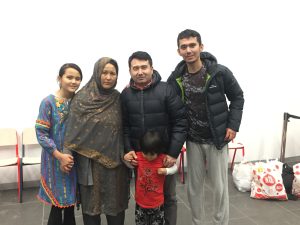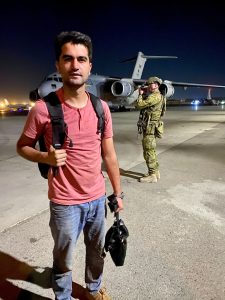Afghan evacuees feel welcome and safe – survey
Afghan families who arrived in Australia four years ago this month after being evacuated from of Kabul as it fell to the Taliban are feeling welcome, safe, confident about their futures and part of Australian society, a new survey has found.
Among the things they value about life in Australia are security and safety, career and educational opportunities and health care. And almost 80 per cent say they now feel part of Australian society.
Their biggest issues are the rising cost of living and fear of unemployment. But more than a third have, or plan, to start a business.
In August 2021 as the Taliban seized control of Afghanistan’s capital Kabul, thousands of ‘locally employed or engaged’ Afghans were airlifted out of the city by the Australian Government and allied countries.
Four years later, a survey commissioned by refugee and migrant settlement agency AMES Australia, has tracked how Afghan refugees in Melbourne, Sydney and Adelaide are faring in various aspects of their lives. It canvased 102 people among a cohort of 3000 who arrived in September and October 2021.
 Asked whether they felt welcome in Australia, an overwhelming number (97 per cent) said they did feel welcome or did most of the time.
Asked whether they felt welcome in Australia, an overwhelming number (97 per cent) said they did feel welcome or did most of the time.
Ninety-three per cent said they found ordinary people welcoming and 83 per cent found government and official institutions welcoming.
Security and safety was cited by 40 per cent of respondents as the ‘best thing about living in Australia’, followed by education (25 per cent) and career opportunities (17 per cent) while 12 per cent cited health care.
Among the worst things cited about life in Australia were ‘missing family and friends’ (56 per cent), ‘language barrier’ (12 per cent) and ‘lack of work’ (8 per cent).
The rising cost of living was the ‘biggest fear’ about life in Australia into the future, identified by 78 per cent of respondents, followed by unemployment (10 per cent) and housing (4 per cent).
Starting a business and getting a job were the main short to medium term goals cited by survey respondents scoring 38 and 18 per cent respectively.
‘Leaving family back in Afghanistan’ was cited as the biggest barrier to getting on with life in Australia (38 per cent), followed by a ‘lack of English language’ (12 per cent) and ‘feeling isolated’ (13 per cent).
Only three percent of those surveyed said they had experienced discrimination of racism. Seventy-eight per cent said they had not and 19 per cent said they had experienced discrimination ‘only sometimes’.
More than a third of people (38 per cent) said life in Australia was as they had expected it to be, while 53 per cent said it was ‘mostly’ as expected.
Most unexpected about life in Australia among the Afghan arrivals were ‘cultural freedoms and permissiveness’ (21 per cent), ‘high cost of living’ (19 per cent), ‘free health care’ (19 per cent), ‘multiculturalism and diversity’ (16 per cent) and the ‘availability of work (11 per cent).
Eight four per cent of respondents were ‘happy with their life in Australia’ and the rest were ‘mostly happy’ while 97 per cent were either ‘happy’ or ‘mostly happy’ with their employment and educational pathways in Australia.
Asked what had been the most important support received since arriving in Australia, 32 per cent cited ‘support with accommodation and necessities on arrival’, 24 per cent said ‘Centrelink benefits’ and 10 per cent said ‘English language lessons’.
Sixty-eight per cent of respondents said they were ‘satisfied with the ongoing support’ they are receiving since arriving in Australia and 22 per cent said they were ‘mostly satisfied’.
Asked whether they intended to stay in Australia or would return to Afghanistan if the situation there improved, 79 per cent said they intended to stay while 10 per cent said they would return and 11 per cent were unsure.
AMES Australia CEO Melinda Collinson said the survey results showed the Afghan evacuees were grateful to be in Australia and intent on building new lives here.
“What comes through in survey is that the Afghans, many of whom were torn from their lives at short notice and in traumatic circumstances, are incredibly resilient and they are intent on rebuilding their lives and on becoming part of Australian society,” Ms Collinson said.
“We can also see that many are entrepreneurial and plan to start businesses,” she said.
 Khalid Amiri was a television presenter and journalist in Afghanistan.
Khalid Amiri was a television presenter and journalist in Afghanistan.
He was able to escape Kabul on an evacuation flight with the help of the then Senator and NDIS and government services minister Linda Reynolds.
Khalid, who recently completed a master’s degree in international relations at Melbourne University, said he felt welcome and a part of Australian society.
“The last four years, since the fall of Kabul to the Taliban and my resettlement in Australia, have been transformative. Starting a new life here has given me opportunities I could not have imagined back in Afghanistan. Completing my master’s degree in international relations at the University of Melbourne was not only a personal achievement but also a testament to the power of education and resilience,” he said.
“One of the most meaningful moments for me has been seeing my younger sister, Hussan Bano, attend school in Australia. Had she remained in Afghanistan, she would have been denied this basic right. Her education here symbolizes the hope and future that every Afghan child deserves.
“In Australia, I have also been able to participate in panel discussions, share my story, and enjoy the freedom of speech—something that is silenced under the Taliban. Above all, I have devoted myself to advocating for refugees and for those left behind in Afghanistan, whose struggles remain close to my heart. The love and affection we have received in Australia since day one of our arrival till date has made us feel proud of living in a country that has given us a lot and proud to call it my new home,” Khalid said.
Hamidreza Arfany came with his mother and sisters on an evacuation flight in 2021. He is now 22 and studying pharmacy at RMIT.
Hamid says he and his family feel safe and welcome in Australia.
“My sisters are at school and my dad is working. I work, also selling rugs in Dandenong on weekends,” he said.
“We have everything we need in Dandenong. There are other members of our community living nearby, we can buy the food and other things we are familiar with – and the local council has programs that support us,” he said.
“We feel comfortable because there are many people from many places across the world. We are not different, in Dandenong being form somewhere else in normal,” Hamid said.
“We are very happy and confident about future. I love Australia and I love that my sisters can go to school and study because in Afghanistan, they would not be able to,” Hamid said.
“We feel comfortable because there are many people from many places across the world. We are not different, in Dandenong being form somewhere else in normal,” he said.












